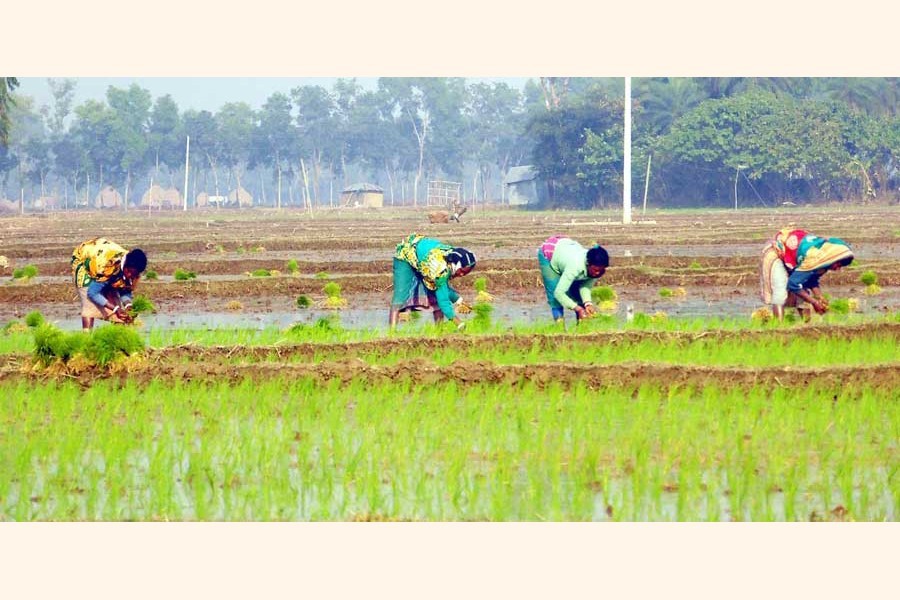Boro farming set to slump
Paddy price woes force farmers to switch to high-value crops

Published :
Updated :

Boro farming is set to decline this season as hundreds of farmers, upset about consistently low paddy and rice prices, have switched to other crops, said insiders.
Market experts expressed deep concern following a downtrend in Boro cultivation that sources the highest 55 per cent of the staple Bangladesh consumes.
Until March 03, Boro farmers transplanted seedlings on 4.44 million hectares of land against 4.74 million hectares in the corresponding period last year, shows the Department of Agriculture Extension (DAE) data.

The target of Boro cultivation is 4.86 million hectares this fiscal year.
Sources said many smallholder farmers have switched to maize, vegetables and tobacco crops this year because of low paddy prices in the last Boro and Aman seasons.
However, a DAE official said the acreage might increase to some extent in the next two weeks, but it is not enough to meet the target.
The highest 4.7 million hectares might come under farming this year against 4.9 million hectares last year, he added.
"But per-hectare yield has been increasing which could help achieve the overall production target of 20.04 million tonnes."
Rice production in Boro season was an all-time high of 20.03 million tonnes last year, according to both the DAE and the Bangladesh Bureau of Statistics (BBS).
Boro is grown from December to mid-March and harvest goes on from April to June in the country.
DAE deputy director (monitoring and evaluation unit) Md Mizanur Rahman said cold waves and cyclonic storm 'Bulbul' caused a delay in cultivation in some regions.
"Farmers have started cultivation largely for the past one month and we're still optimistic about achieving the target," he told the FE.
Agrarian Research Foundation chairman Dr Abdul Hamid said many farmers in Rangpur, Dinajpur, Kushtia, Rajshahi, Khulna and Jashore regions have switched to maize, vegetables and tobacco crops this year.
The very likely reason is the low prices of paddy during the last Boro and Aman seasons, he cited.
Dr Hamid said the big farmers, who usually lease out their land to landless peasants, could not find their match amid persisting low paddy prices.
"Land leasing for paddy farming has declined by 10-12 per cent this year as per our primary reports," he disclosed.
Agriculture Marketing Department assistant director TM Rashed Khan said farmers incurred losses as Boro paddy prices fell to just Tk 380-450 per maund against the production costs of Tk 850-960.
They also suffered massive losses during Aman season that ended in January as paddy prices were only Tk 550-620 per maund, he added.
Mr Khan said paddy prices started rising from the third week of February as farmers had nothing to sell then.
The current prices of seasonal Swarna paddy variety are Tk 700-740 per maund.
Mohammad Asaduzzaman, a professorial fellow at the state-run Bangladesh Institute of Development Studies, said declining Boro production sets alarm bells ringing for food security.
He said policy-makers should take it seriously so that market volatility like the one in 2017 does not revisit.
Boro output dropped to 18 million tonnes in 2017 from 18.93 million tonnes in 2016 amid a severe crop loss in haor and several other districts for floods.
Rice prices jumped to a record Tk 55 (course) and Tk 80 (finer) a kilogram in September 2017, according to the Trading Corporation of Bangladesh (TCB).
The country imported a record 4.0 million tonnes of rice in FY 2018.
Mr Asaduzzaman said Boro farmers should have been compensated for a price debacle, but no action was in sight on the part of the government.
The local peasantry also incurred losses in the just-concluded Aman harvest time.
He said agriculture ministry has declared to allocate Tk 30-billion incentive for farm mechanisation in FY 2020 which is yet to be implemented.
Food, agriculture, commerce, planning and finance ministries should discuss the matter if Boro acreage declines at such a notable rate, he asserted.
They should review export and import policies regarding rice trade to maintain the existing check and balance, he observed.
Rice prices have showed an 8.0-14 per cent hike in the last one month in Dhaka city, according to the TCB.
However, the data available with the food directorate general show public warehouses have a handsome stock of 1.45 million tonnes of the staple.
Rice production hit a record 37.2 million tonnes in fiscal year 2019, according to the BBS.
In the global market, rice prices are almost static at $380-425 a tonne (India, Vietnam and Thailand).


 For all latest news, follow The Financial Express Google News channel.
For all latest news, follow The Financial Express Google News channel.